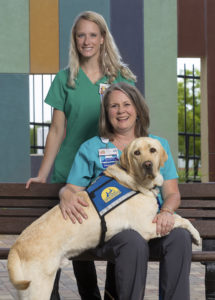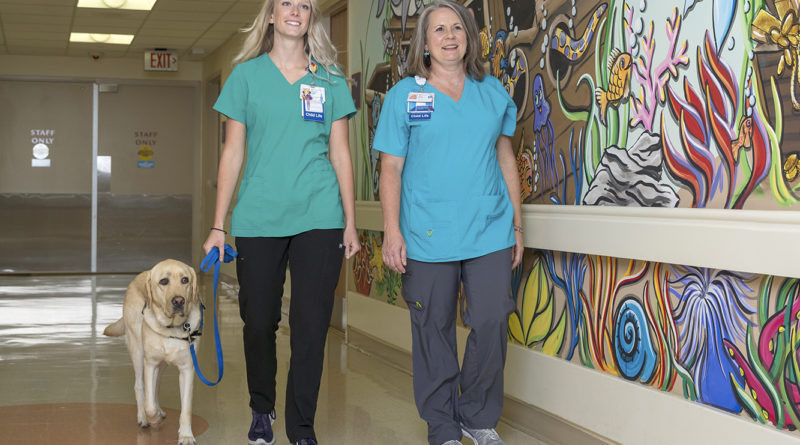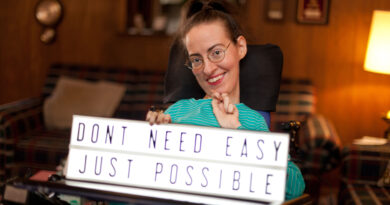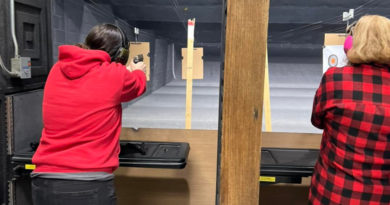Canine approach to care
Lorenzo makes rounds at McLane Children’s Medical Center
By Stacy Moser
Photography by Rusty Schramm, courtesy of Baylor Scott & White Health
Leah Woodward and Ashley Blackmon spend their days safeguarding children who face some of life’s scariest situations.

Leah and Ashley are child life specialists at Baylor Scott & White McLane Children’s Medical Center—they come to the rescue whenever hospitalized kids need a smile, an explanation about what’s happening or just a plain old hug. “Our job is to support the children,” Leah explains, “whether that’s prepping or coping with procedures or talking with kids and their families about a medical diagnosis. We do everything we can to normalize the environment for a child who’s here for a long time. We want to make the hospital a less scary place.”
Leah recalls how she landed here as a child life specialist. “I love working with children and the hospital environment. It made sense to me that child life would be a good career path for me since my dad worked at Scott & White for years in hospital administration. This was my first choice where I wanted to work.”
Ashley says she feels lucky to work in this field, too. “At first I looked into medicine, but I was more interested in the psychology behind it than the actual medical side. When I found out you could combine working with kids and the medical aspect, this job rolled everything I wanted to do into one.”
For these two ambassadors of comfort, the job of relieving patients’ stress just got a lot easier. Lorenzo, a 3-year-old Labrador/Golden Retriever mix, has joined the staff at the hospital and is making the rounds, visiting young patients with Leah and Ashley every day.
The idea to adopt Lorenzo, known as a trained facility dog, was a team effort at the hospital. “We knew other hospitals in Texas had facility dogs, so we looked into it to see if it was something we could manage,” Leah says. “Our manager and director went to a ‘facility dog summit’ where hospitals that already had these types of dogs introduced the idea to others who didn’t have one yet. Coincidentally, the president of our hospital, Dr. John Boyd, heard about Canine Companions for Independence, which has a large training center on the Baylor Scott & White–Irving campus. That was the motivation we needed to be the first Texas children’s hospital to have a dog from Canine Companions.”
Detailed applications were completed and in-person interviews were performed. Then Leah got the call from Canine Companions—she and Ashley had been approved to come to their campus and train to receive a facility dog for McLane Children’s. When Ashley is asked about their reaction to the news, she smiles at Leah. “Leah cried a lot,” she teases. “We were ecstatic.”
The two ladies traveled to Dallas to the Canine Companions center, where dogs are trained and ultimately matched with someone with a disability or a facility that has applied for a dog. Ashley enthusiastically describes her two-week experience training to work with the dogs. “You go there not knowing what dog you’re going to get. There were other groups of people along with us who were learning commands with 10 different dogs. So Leah and I would go back to our room every night and talk about the dogs, ‘Which one do you think it will be?’ It was cool because, after the first week, we got to see everyone receive their dog. We sat on the floor in a circle and they brought each training group’s dog out and we were crying with happiness for everyone because we got to know all the dogs and people so well.
“It’s amazing to see how they train the dogs,” she says. “They have a kennel area, play area and multiple rooms—you’d walk by doors and see trainers with things like wheelchairs set up to familiarize the dogs with and tables so dogs could learn how to jump on and off. They have different toys and activities, and all those cute little Lorenzos are learning to do things like deliver objects and obey commands.”
“The trainer told us that Lorenzo really loves small children,” Leah says. “His love for kids is obvious. When you see him go in a room, his tail is wagging, especially when he sees the little ones. So I do think his strong love for children made him a good candidate for life in a hospital.”
Lorenzo went home with Leah, also adjusting to life as a member of a family with other dogs. At first, Leah’s Shih Tzu and Dachshund weren’t terribly fond of Lorenzo, but he eventually won them over. He spends time with Ashley in her home in Georgetown, too, where Ashley’s Golden Retriever has apparently fallen head over heels for Lorenzo.
“He plays with her, but when he tries to signal her that he’s tired, she won’t leave him alone. She’s in love,” Ashley smiles as she rolls her eyes.
“The trainers told us one of the reasons they picked Lorenzo was because of his calm nature. He does things slowly—they referred to him as an ‘old soul.’ We’d see some dogs and when you’d say the command ‘Sit!’ they’d be sitting even before you stopped talking. But Lorenzo takes his time and is a little bit slower, he’s very thoughtful. He’s really comfortable with crowds, too. So when he’s with media or getting his picture taken, it doesn’t cause him stress,” Ashley says.
“It’s funny because in the morning when he hears me get his collar and his vest, he gets excited and his tail starts wagging because he knows where we’re going,” Leah laughs. “He will have a little pep in his step, this little bounce, because he knows we’re off to the hospital.”
Both ladies agree that Lorenzo has made a huge difference in the attitudes of patients he visits. “He makes my job so much better,” says Ashley. “Before Lorenzo, it was totally different. I feel like I reach a wider variety of patients now. More patients are open to seeing me. The teenagers, they didn’t want to see a child life specialist—that wasn’t cool. But now I have a dog and they can’t wait for us to come in. And there’s a noticeable difference during painful procedures when Lorenzo is there for a child to hold. The child’s demeanor is calm, the staff’s attitude is happier, the family is calmer. Everything I do has now been made easier and better because we have him with us.”
Leah nods in agreement. “People tell us we officially have the best job in the hospital, without a doubt, having Lorenzo. A big part of our job is to establish rapport with patients quickly, so we can provide support. He makes that almost instantaneous. His sweet, gentle nature makes it so easy to go in and start a conversation. I had a patient this morning say, ‘I feel so much better now that he’s here.’ He genuinely makes a difference.”




